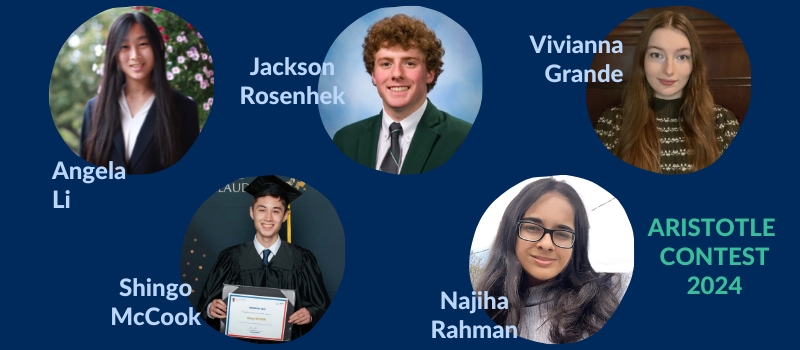
Congratulations to Angela Li, Jackson Rosenhek, and Vivianna Grande, the winners of the 2024 Aristotle Essay contest! In this year’s competition, again co-sponsored by the Department of Philosophy at the University of Toronto and the Ontario Philosophy Teachers’ Association (OPTA), high school students from across Canada submitted essays on three prompts: the aesthetic value of AI art, animal rights, and human agency. Eight adjudicators described the winning essays as “true philosophy papers,” in which the authors answered probing philosophical questions with clarity and depth of thought.
This year marked the sixth time budding philosophers tested their writing mettle in the contest after its reinstatement in 2018, and the first to include submissions from Alberta. It was also the first time the competition benefited from the generous support of Anita Angelini, whose donation made possible the prize money for Li, Rosenhek, and Grande.
Prospective philosophers don’t often get a chance to show off their skills outside of post-secondary education. According to Jim John, director of undergraduate studies in the Department of Philosophy and the competition lead, the Aristotle Contest provides a venue for students to think out loud about challenging topics and to prove to academics how much they have learned about philosophical thinking even at a very young age.
The first-place winner of 2024, Angela Li, from Markham’s St. Robert Catholic High School, answered the challenge by mounting a three-part argument in an essay titled “The Moral Impermissibility of Pet Ownership.” In it, she claimed that non-human animals have intrinsic moral value, navigating complex questions of ethics, responsibility, and sentience. Li described participation in the Aristotle Contest as “a great experience.” “It allowed me to explore a philosophical topic that I’ve always been curious about,” she says, adding, “it was an interesting and complex topic, and I found that throughout brainstorming, researching, and writing the essay, my perspective shifted many times before finally settling on a stance.”
Jackson Rosenhek’s essay, “Reimagining Aesthetic Value: Art in the Age of Artificial Intelligence,” took second place. He argued that machine learning models can produce works of art with the same kinds of aesthetic value as ones produced by humans. His essay tackled a challenging, controversial opinion and provided a solid philosophical foundation for his views. Jackson is in his final year of high school at Toronto’s Crescent School and plans to study business or economics alongside philosophy at a post-secondary university—choices reinforced, he submits, by his positive experience preparing for the Aristotle Contest.
Vivianna Grande’s third-place essay argued on the same prompt as Rosenhek’s but took a slightly different tack. In “Beyond Replication: AI Art and Its Search for Aesthetic Value,” the student from Villanova College in King City claimed that, while AI can produce work that qualifies in a minimal sense as “art,” it cannot create work with the expressiveness, individuality, and cultural resonance that are hallmarks of human art. She says, “The experience [of writing for the contest] was amazing, as it pushed me further than the curriculum at school does, along with having engaging topics to ruminate about.”
Two essays received honourable mentions this year: Shingo McCook (Lycée Claudel, Ottawa), “Punishing the Morally Unaccountable” and Najiha Rahman (R. H. King Academy, Scarborough), “The Irreplicable Human Disorder: On the Aesthetic Value of AI Art.”
Issues of aesthetic value and personal sentience have long been debated and contested in philosophical circles, even among its youngest members. During the first year of the new Aristotle Contest in 2018, winner Eric Fishback, who went own to earn a master’s degree in Philosophy at U of T, argued for the objective truth of beauty and art. Now new high school philosophers have taken up the mantle, complicating the debate with the introduction of AI and machine learning.
Once again, congratulations to the winners of the 2024 Aristotle Contest, and many thanks to everyone who entered the contest or supported someone who did—teachers, mentors, and parental figures all have essential roles to play in the students’ writing successes.
Next year’s Aristotle Contest prompts will be released in March 2025—so there’s plenty of time to sharpen pencils, fire up laptops, get some reading done, and put on a philosophy thinking cap
SHARE